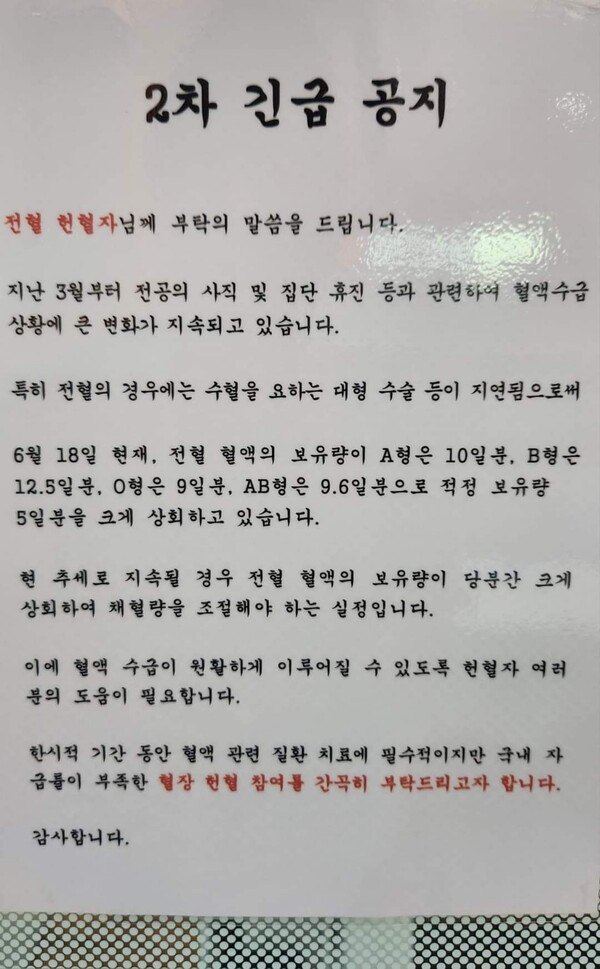"Since March, there have been major changes in the blood supply and demand situation related to the resignations of trainee doctors and collective furloughs. The whole blood in particular, due to delays in major surgeries requiring blood transfusions, has far exceeded the appropriate reserve of five days. If the current trend continues, the reserves of whole blood will greatly exceed the appropriate level for the time being, and the amount of blood collection must be controlled."
This is the content of a notice posted at a blood donation house a netizen visited. The mass resignation of trainee doctors is also affecting the blood supply problem.

However, the Korean Red Cross explained that the current increase in blood reserves is due to seasonal factors.
"The notice was issued by the blood donation clinic operated by the Seoul Southern Blood Center," said a spokesperson for the Korean Red Cross. “The blood center temporarily recommended donors to donate plasma components to ensure stable blood management based on the blood inventory situation."
The amount of erythrocyte preparations in the notice also differs from the current level on June 18. As of July 12, the national erythrocyte preparation stock was at a stable level of 7.6 days, the official added.
"The blood management headquarters maintains an adequate inventory of each blood product to respond to fluctuations in blood demand. While we may temporarily recommend plasma component donations depending on the inventory status of each blood source, there has been no reduction or suspension of blood donations,” the spokesperson said. “All blood donation centers and buses across the country operate normally."
The average blood reserve in June was 9.6 days. On June 18 when the notice was posted, the whole blood reserve was 10 days for Type A, 12.5 days for Type B, nine days for Type O, and 9.6 days for Type AB. Red blood cell products are considered "adequate" if they have more than five days of blood in stock.
The situation where blood reserves have remained stable has been going on since March.
"January to March every year is when the blood supply is difficult due to school vacations and cold weather. This year, however, the average monthly red blood cell reserve has increased since March due to the resignation of trainee doctors and other reasons," the Korean Red Cross said.
In particular, it attributed the stabilization of blood reserves to seasonal factors more than the resignation of trainee doctors.
May to June are the most stable months of the year when high school and university group blood donations are active," it said. "This year, however, the resignation of trainee doctors may have had some impact."
It also reiterated that higher-than-adequate blood reserves are not a cause for concern about discarding blood and that by encouraging plasma donations in addition to whole blood donations, the Korean Red Cross is responding to fluctuations in blood demand by maintaining adequate inventories of each type of blood product, not by accepting fewer donations.
"It is most stable to maintain a seven to eight-day supply of blood because if the stock of erythrocyte products is close to five days' supply, it only takes one day of disruption to enter a blood supply crisis," it said. "We are maintaining stable blood stocks and are not at the point where we need to worry about discarding expired blood."
"Every year, blood donations drop significantly during the summer months (late July to early September) due to high school and university vacations, summer vacations, and overseas travel," it said. "This year, there are various variables, including the mass resignation of trainee doctors, in addition to seasonal factors of the rainy season and heat waves, so we are working to maintain stable inventory levels."
Related articles
- 3 tertiary hospitals refuse to fill vacancies caused by trainee doctors’ mass resignation
- Teaching hospitals fire 7,648 trainee doctors, seek to hire 7,707 in autumn
- Resigned trainee doctors face difficulties finding jobs with halved paychecks
- Blood transfusions fell sharply due to medical turmoil, delaying care for critical patients

